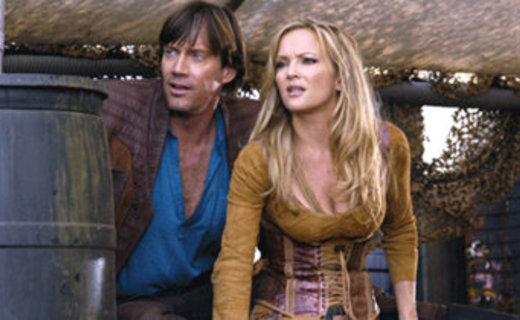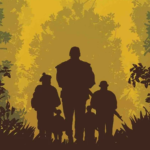
Gene Roddenberry believed in the future. His vision for Star Trek imagined a progressive society that put aside their differences and worked together without conflict for the betterment of the human race, an evolved form of humanity reaching beyond the limits of our childlike selves. Roddenberry’s future promised a grand Federation of worlds that reached out to new life and governed galactic peace as we reached out into the final frontier. Yet even the greatest optimist of them all couldn’t shake the pessimism that defines the human condition. After building Star Trek as a perfect utopia, Gene Roddenberry imagined a timeline where the Federation would fall.
Genesis II, Starship, and Andromeda
“The long night has come. The Systems Commonwealth, the greatest civilization in history, has fallen. Now, one ship, one crew have vowed to drive back the night and rekindle the light of civilization. On the starship Andromeda, hope lives again” – Intro to Andromeda Season One
That statement is a dramatic oversimplification of course. Apart from a few scattered notes, there was never any definite plan left behind for the future of Star Trek after Gene Roddenberry passed away in 1991. Certainly nothing that Rick Berman and Brannon Braga drew on while crafting the complicated mythologies of Deep Space Nine and Enterprise. Instead, the closest we get to a Star Trek “darkest timeline” is Andromeda, an early 2000s syndicated series from Tribune Entertainment, the same studio that resurrected Roddenberry’s Earth: Final Conflict.
While not exactly Star Trek, Andromeda proves that the foundation for the fall of the Federation existed in Roddenberry’s mind. Robert Hewitt Wolfe & Majel Roddenberry created Andromeda in part by combining Gene Roddenberry’s original notes for a post-apocalyptic television series dating back to the 1970s. The concept (a man frozen beyond his time and tasked to rebuild society) was paired with his concept for a series about a sentient starship. Previous attempts such as Genesis II or Planet Earth saw “Dylan Hunt” as a scientist awoken from suspended animation, either working to rebuild society or merely trying to survive.
It doesn’t take much to see the Star Trek DNA all over Andromeda once you set out to look for it. The Systems Commonwealth is a utopian society set in the far future: much like the Federation. With a membership of thousands of planets, the High Guard are the militaristic and diplomatic force that governs galactic peace: much like Starfleet. That peace is disrupted by a civil war initiated by the Nietzscheans, warrior-poets who hold honour and “enlightened self-interest” as higher goals. Do you see the forehead ridges yet? Looking back, it’s assumable that Andromeda was envisioned as a Star Trek series in all but name. Trading in the analogues for their real-deal counterparts, one can envision Star Trek: Andromeda as a series set in a future where Klingons betray the Federation from within Starfleet ranks and descend a utopian universe into civil war. Earth descends into chaos, martial law overtakes law and order, and the Vulcans abandon the universe entirely.
Why Should I Care?
There was promise in Andromeda, yet many of the engaging concepts from the series fail to get the credit they deserve. The use of sentient AI, probably the biggest takeaway from Roddenberry’s original notes, is a unique look at the relationship between man and machine. Lexa Doig showed conflict through dual roles in a way that Canadian actresses seem to excel. The skeleton crew encouraged more character-focussed work than we’d ever seen on a Star Trek series before, and encouraged the bond between the ship and her crew even more than usual.
It explored the universe and it did it Roddenberry’s way. Even as enemies, the Nietzscheans and Magog are given admirable figureheads in the forms of Geheris Rhade and Rev Bem. For the Nietzscheans in particular, season three’s “The Unconquerable Man” shows an even better premise for the series, when the Nietzschean First Officer Geheris Rhade takes Dylan’s place in rebuilding the Commonwealth he helped destroy. Exploring honour, regret, and second chances, it’s as as close to a Star Trek thinkpiece as Andromeda would ever get. All the more impressive when you consider it was primarily intended as a Sorbo-lite clip show in an admittedly shaky season.
On the antagonist’s side, the Magog were a truly dangerous and animalistic threat, truly terrifying in their barbarity. The Magog’s presence makes Andromeda a Star Trek merged with Alien as much as anything else. Deep Space 9 gave us the Dominion is a constant, season-spanning threat that defined the series in many viewers eyes. It’s hard to remember that Andromeda had that built in from the start, a laser focus putting our protagonists immediately at odds with the major players in the galaxy.
But it’s the Star Trek hot take that keeps me interested in Andromeda sixteen years after its premiere. Looking at it through that lens, it’s interesting to see what Wolfe, and in some ways Roddenberry himself, thought about the universe he helped create. Nietzscheans as Klingons reads like the anxieties the Federation itself may have about letting Klingons join the Federation. A philosophy guided by “enlightened self interest” is a ticking time bomb providing a true internal conflict for an organized group. Imagine Worf killing Picard in the pilot of Star Trek: The Next Generation. That betrayal shapes the series, and Andromeda spends much of its time exploring the flaws of a philosophy that destroys rather than builds.
Hope Lives Again
I have faith in nothing but this – when the universe collapses and dies, there will be three survivors: Tyr Anasazi, the cockroaches, and Dylan Hunt, trying to save the cockroaches. – Tyr Anasazi
What makes Andromeda comparable to a Star Trek series? Throughout both Andromeda and Star Trek is the constant theme of hope. Dylan’s whole journey is about clinging to hope in rebuilding the System’s Commonwealth and reclaiming order in a chaotic and often cynical universe. Throughout the first season-and-a-half which demonstrated the true vision of Andromeda, Wolfe gave viewers stories that challenged Dylan to respond to these hardships with an optimism that even Roddenberry would have admired. And it did it in some ways Star Trek failed to do.
The Star Trek franchise, during Roddenberry’s lifetime at least, was one of staid predictability and sterile melodrama. It predicted a stable form of government which would perpetuate itself from the 23rd Century to the 24th with the biggest change over the course of a century being the design of the uniforms. It’s a challenge to the point where writers on the early seasons of The Next Generation were given the instruction that no two members of the crew should ever outright disagree. Andromeda at least tried to do something different with the politics by shaking up this formula and taking the utopia out of Star Trek’s perfect future. Giving the series a more serialized goal places this series more on terms with Battlestar Galactica than Voyager.
It’s a complaint that many fans expressed about The Next Generation. In a perfect utopia, there are no stakes for drama. Deep Space Nine episode “In the Pale Moonlight” is probably the best example of this, though the same thing can be seen in The Next Generation episode Journey’s End as well as Star Trek: Insurrection. And this does solve the problem. It creates drama. Unfortunately it does it in a way that’s a betrayal of Star Trek’s original ideals. It’s easy to be optimistic where the right choices are the easy ones. Andromeda thrived as a series where those ideals were strained in their execution. Dylan Hunt is a true believer in the Commonwealth as much as Tasha Yar believed in the Federation. A Federation true believer like Tasha Yar with the swagger of mournful Captain Kirk could have made Dylan Hunt into Star Trek’s most interesting Captains yet.
By 2000, Star Trek was effectively a dead fish. Andromeda was what Star Trek needed to do in the 21st century. While Enterprise looked backwards to the beginning of the Federation, Andromeda unabashedly moved forwards. Yet both effectively told the same story. The Federation may fall, but it will always pick itself up again. The difference in direction is key. Andromeda pushes forward in a way that Gene would have approved of.
Don’t Even Talk To Me About Seefra

You know, you catch more flies with honey than vinegar. Although, I don’t know why you’d want to catch flies. They’re actually quite dirty little things. – Trance Gemini
The potential good in Andromeda often gets forgotten due to the changes Tribune Entertainment made to the show in its second season, most notably the firing of Robert Hewitt Wolfe. Rumour has it that several members of the cast (including executive producer Kevin Sorbo) had been frustrated with the seemingly complicated plots of Wolfe’s scripts. In a television climate before LOST and Battlestar Galactica, nobody wanted a syndicated series with a truly serial format. The creator was let go, with Tribune retooling the show to become more episodic action-oriented as time went on.
Robert Hewitt Wolfe was the driving force behind the series since its beginning. Although the genesis of the series began with Gene Roddenberry, Wolfe reinterpreted those failed pilots and leftover notes into a truly unique vision. Unfortunately, without Wolfe, the series suffered. The effects of this dismissal can be seen as early as the second season’s Ouroboros, the first after Wolfe had left. From this point on, Dylan becomes the unquestioned hero and focus of the series to the point where many fans derisively refer to these later seasons as Hercules: The Legendary Space Journeys. We don’t even talk about season five, the series that ditched space travel, exploration, and even the Andromeda itself to throw the characters in a pastiche border town in the old west to save money.
Because of this, we never get a series that grows out of its adolescent fixation on action and camp melodrama. If the highlights of those early seasons under Wolfe’s direction are considered earnestly: the perseverance, the optimism, the focus on rebuilding a fallen universe, the promise inherent in this show was vast. Just remember how The Next Generation struggled in its first two seasons, and you can begin to imagine where Andromeda may have soared if given enough room to truly grow into its premise. Instead, we got a series that relished in making Dylan Hunt the saviour of a universe through punching bad guys in the face.
Shortly after the series finale of Andromeda in 2005, Wolfe released a short screenplay titled Coda detailing the possible future of the series if he had stayed on board. With ideas like Trance being the avatar of a sun or Harper becoming one with The Consensus of Parts (Hi, Definitely-Not-The-Borg!) it could have amounted to a genuinely interesting series. We could have gotten more episodes like “The Unconquerable Man” and less like… well, anything in season five.
The Long Night Has Come
Dylan Hunt may never join Kirk, Picard, Sisko, Janeway, and Archer in the ranks of true Star Trek series captains. Kevin Sorbo himself may be partially responsible for the downfall of this series, and the removal of Wolfe from the creative team means the true potential of Andromeda was never quite reached. Yet there will always be a place for Andromeda in my heart and the dissonant values it brought to the (not quite) Star Trek universe.
Would a series like this ever be made while Gene Roddenberry was alive? It’s doubtful. While the constant theme of hope and optimism in the face of an uncaring universe are definitely in line with Roddenberry’s goals, it’s likely he would have felt Star Trek to be too precious to take such a risk. But I’ll always remember Andromeda. It took the destruction of everything Star Trek was to create a series where hope lived again.


![[REVIEW] ‘THE HUSTLE’ MAY HAVE CONNED THEMSELVES INSTEAD](https://geekd-out.com/wp-content/uploads/2019/05/TheHustle-150x150.jpg)
